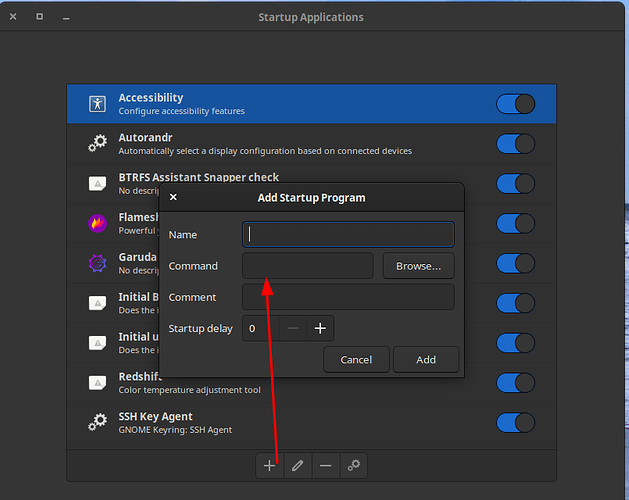Hello! I just installed Garuda Linux onto a Dynabook Portege X50-G. I am also running tlp if that helps. Here's my inxi below:
System:
Kernel: 5.15.74-1-lts arch: x86_64 bits: 64 compiler: gcc v: 12.2.0
parameters: BOOT_IMAGE=/@/boot/vmlinuz-linux-lts
root=UUID=1f623fc4-c2f5-4466-814d-7bf5acec1bc7 rw rootflags=subvol=@
quiet quiet splash rd.udev.log_priority=3 vt.global_cursor_default=0
resume=UUID=ed586f59-3328-4a0d-bfc3-f277bbdc5f9f loglevel=3
Desktop: Cinnamon v: 5.4.12 tk: GTK v: 3.24.34 wm: Mutter vt: 7
dm: LightDM v: 1.32.0 Distro: Garuda Linux base: Arch Linux
Machine:
Type: Laptop System: Dynabook product: dynabook PORTEGE X50-G
v: PLR41U-066006 serial: <superuser required> Chassis: type: 10
v: Version 1.0 serial: <superuser required>
Mobo: Dynabook model: A0106/0002 v: Version A0
serial: <superuser required> UEFI: Dynabook v: Version 2.20
date: 04/19/2021
Battery:
ID-1: BAT1 charge: 32.8 Wh (73.2%) condition: 44.8/46.5 Wh (96.3%)
volts: 0.1 min: 11.4 model: G71C000LU111 type: Li-ion serial: <filter>
status: discharging
CPU:
Info: model: Intel Core i7-10510U bits: 64 type: MT MCP
arch: Comet/Whiskey Lake note: check gen: core 10 level: v3 note: check
built: 2018 process: Intel 14nm family: 6 model-id: 0x8E (142)
stepping: 0xC (12) microcode: 0xF0
Topology: cpus: 1x cores: 4 tpc: 2 threads: 8 smt: enabled cache:
L1: 256 KiB desc: d-4x32 KiB; i-4x32 KiB L2: 1024 KiB desc: 4x256 KiB
L3: 8 MiB desc: 1x8 MiB
Speed (MHz): avg: 931 high: 1000 min/max: 400/4900 scaling:
driver: intel_pstate governor: powersave cores: 1: 1000 2: 1000 3: 950
4: 900 5: 900 6: 900 7: 900 8: 900 bogomips: 36799
Flags: avx avx2 ht lm nx pae sse sse2 sse3 sse4_1 sse4_2 ssse3 vmx
Vulnerabilities:
Type: itlb_multihit status: KVM: VMX disabled
Type: l1tf status: Not affected
Type: mds status: Not affected
Type: meltdown status: Not affected
Type: mmio_stale_data mitigation: Clear CPU buffers; SMT vulnerable
Type: retbleed mitigation: Enhanced IBRS
Type: spec_store_bypass mitigation: Speculative Store Bypass disabled via
prctl and seccomp
Type: spectre_v1 mitigation: usercopy/swapgs barriers and __user pointer
sanitization
Type: spectre_v2 mitigation: Enhanced IBRS, IBPB: conditional, RSB
filling, PBRSB-eIBRS: SW sequence
Type: srbds mitigation: Microcode
Type: tsx_async_abort status: Not affected
Graphics:
Device-1: Intel CometLake-U GT2 [UHD Graphics] driver: i915 v: kernel
arch: Gen-9.5 process: Intel 14nm built: 2016-20 ports: active: eDP-1
empty: DP-1,DP-2 bus-ID: 00:02.0 chip-ID: 8086:9b41 class-ID: 0300
Device-2: Chicony TOSHIBA Web Camera - HD type: USB driver: uvcvideo
bus-ID: 1-7:2 chip-ID: 04f2:b689 class-ID: 0e02
Display: x11 server: X.Org v: 21.1.4 driver: X: loaded: modesetting
alternate: fbdev,intel,vesa dri: iris gpu: i915 display-ID: :0 screens: 1
Screen-1: 0 s-res: 1920x1080 s-dpi: 96 s-size: 508x285mm (20.00x11.22")
s-diag: 582mm (22.93")
Monitor-1: eDP-1 model: Sharp 0x14c4 built: 2019 res: 1920x1080 hz: 60
dpi: 142 gamma: 1.2 size: 344x194mm (13.54x7.64") diag: 395mm (15.5")
ratio: 16:9 modes: 1920x1080
Message: Unable to show GL data. Required tool glxinfo missing.
Audio:
Device-1: Intel Comet Lake PCH-LP cAVS driver: snd_hda_intel v: kernel
alternate: snd_soc_skl,snd_sof_pci_intel_cnl bus-ID: 00:1f.3
chip-ID: 8086:02c8 class-ID: 0403
Sound API: ALSA v: k5.15.74-1-lts running: yes
Sound Server-1: PulseAudio v: 16.1 running: no
Sound Server-2: PipeWire v: 0.3.59 running: yes
Network:
Device-1: Intel Comet Lake PCH-LP CNVi WiFi driver: iwlwifi v: kernel
bus-ID: 00:14.3 chip-ID: 8086:02f0 class-ID: 0280
IF: wlo1 state: up mac: <filter>
Bluetooth:
Device-1: Intel AX201 Bluetooth type: USB driver: btusb v: 0.8
bus-ID: 1-10:4 chip-ID: 8087:0026 class-ID: e001
Report: bt-adapter ID: hci0 rfk-id: 1 state: down
bt-service: enabled,running rfk-block: hardware: no software: yes
address: <filter>
Drives:
Local Storage: total: 476.94 GiB used: 12.84 GiB (2.7%)
SMART Message: Unable to run smartctl. Root privileges required.
ID-1: /dev/nvme0n1 maj-min: 259:0 vendor: Samsung
model: MZVLB512HBJQ-00007 size: 476.94 GiB block-size: physical: 512 B
logical: 512 B speed: 31.6 Gb/s lanes: 4 type: SSD serial: <filter>
rev: EXF7202Q temp: 36.9 C scheme: GPT
Partition:
ID-1: / raw-size: 459.73 GiB size: 459.73 GiB (100.00%) used: 12.84 GiB
(2.8%) fs: btrfs dev: /dev/nvme0n1p2 maj-min: 259:2
ID-2: /boot/efi raw-size: 300 MiB size: 299.4 MiB (99.80%) used: 608 KiB
(0.2%) fs: vfat dev: /dev/nvme0n1p1 maj-min: 259:1
ID-3: /home raw-size: 459.73 GiB size: 459.73 GiB (100.00%) used: 12.84
GiB (2.8%) fs: btrfs dev: /dev/nvme0n1p2 maj-min: 259:2
ID-4: /var/log raw-size: 459.73 GiB size: 459.73 GiB (100.00%) used: 12.84
GiB (2.8%) fs: btrfs dev: /dev/nvme0n1p2 maj-min: 259:2
ID-5: /var/tmp raw-size: 459.73 GiB size: 459.73 GiB (100.00%) used: 12.84
GiB (2.8%) fs: btrfs dev: /dev/nvme0n1p2 maj-min: 259:2
Swap:
Kernel: swappiness: 133 (default 60) cache-pressure: 100 (default)
ID-1: swap-1 type: partition size: 16.91 GiB used: 0 KiB (0.0%)
priority: -2 dev: /dev/nvme0n1p3 maj-min: 259:3
ID-2: swap-2 type: zram size: 15.38 GiB used: 0 KiB (0.0%) priority: 100
dev: /dev/zram0
Sensors:
System Temperatures: cpu: 43.0 C pch: 44.0 C mobo: N/A
Fan Speeds (RPM): N/A
Info:
Processes: 297 Uptime: 7m wakeups: 957 Memory: 15.38 GiB used: 2.11 GiB
(13.7%) Init: systemd v: 251 default: graphical tool: systemctl
Compilers: gcc: 12.2.0 Packages: pm: pacman pkgs: 1512 libs: 516
tools: octopi,paru Shell: fish v: 3.5.1 default: Bash v: 5.1.16
running-in: gnome-terminal inxi: 3.3.22
Garuda (2.6.9-1):
System install date: 2022-10-22
Last full system update: 2022-10-23
Is partially upgraded: No
Relevant software: NetworkManager
Windows dual boot: No/Undetected
Snapshots: Snapper
Failed units:
I have several issues with the installation. One of them is that upon certain startups, or waking up from hibernation, my laptop runs extremely laggy, as in there's a huge delay when I type, and my touchpad becomes almost unusable, sometimes when I move it, it stops after a while and clicks by itself, even though I haven't pressed down on the touchpad. Sometimes a restart solves this issue, but it is very annoying, and I can't seem to predict when it will and won't happen. My touchpad buttons also won't work, the laptop has dedicated left/right click buttons but pressing them doesn't do anything. I have to click on the touchpad itself.
Other than these issues, and a couple of minor ones I don't mind, Garuda runs fantastically when it does run well. Any tips, or stuff I can try? It's pretty annoying to have to restart the laptop every few minutes. If I need to clarify anything, please let me know. ^^
Thanks in advance!
